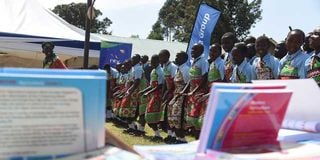Policy and decision-making in education sector is erratic

Kaptuktuk Junior Secondary School in Eldoret.
For the last decade or so, policy and decision-making in the education sector has at best been erratic. Firstly, without sufficient public participation and civic education as required in the Constitution and the requisite policy papers and legal framework, Competency-Based Curriculum (CBC) was conceptualised and launched at Primary Grade Three. To date, the sessional paper on education reforms and the 11 pieces of legislation that needed to be enacted have not been debated in the National Assembly. One wonders how the Treasury appropriates finances to the junior secondary school (JSS) level that is not recognised in any law.
Secondly, the domiciling of JSS has oscillated between primary and secondary schools between Uhuru Kenyatta’s and William Ruto’s administrations, with resources being deployed inappropriately before changes occur.
Thirdly, the Presidential Working Party on Education Reforms (PWPER) was mandated to review and recommend a governance and financing framework for university education, research and training. Before the report was completed, the government launched a new university funding model, leading observers to believe that the PWPER would be forced to adopt this model, or conversely, the government was privy to the content of the PWPER recommendations that would tally with the model. What was the cause for the hurry to launch this model? One year down the line, the model has become so contentious that Cabinet Secretary Julius Ogamba promised to set up two committees to listen to students’ grievances, to forestall a students’ strike, taking us back to the PWPER terms of reference.
Fourthly, the Teachers Service Commission (TSC) launched its 2023–28 strategic plan ahead of the PWPER report in a manner that may have reflected the commission’s lack of respect for the working party, yet its recommendations were to have a major impact in basic education in which the TSC is a major stakeholder. Why did TSC do so?.
Fifthly, the Ministry of Education directed that JSS be domiciled in primary schools and went ahead to license several private schools to establish JSS within existing senior secondary schools. Was this restriction meant for public schools only?
Sixthly, during the floods of April 2024, the ministry directed the postponement of the opening of schools because of safety considerations two days before the opening date when some students had already started travelling, and directed field officers to give a status report on the effect of floods by Friday of the next week. The ministry announced the opening date before analysing the data it had asked for.
Seventhly, two days before schools opened on August 26, the ministry directed that students register to join the medical insurer, SHIF, before returning to school, which they could have done as the August holidays began. Further, SHIF later clarified that they expected the students to be registered under their parents’ names. What a confusion!
Benjamin Sogomo, education expert /former secretary, TSC. [email protected]; @Bsogemo





